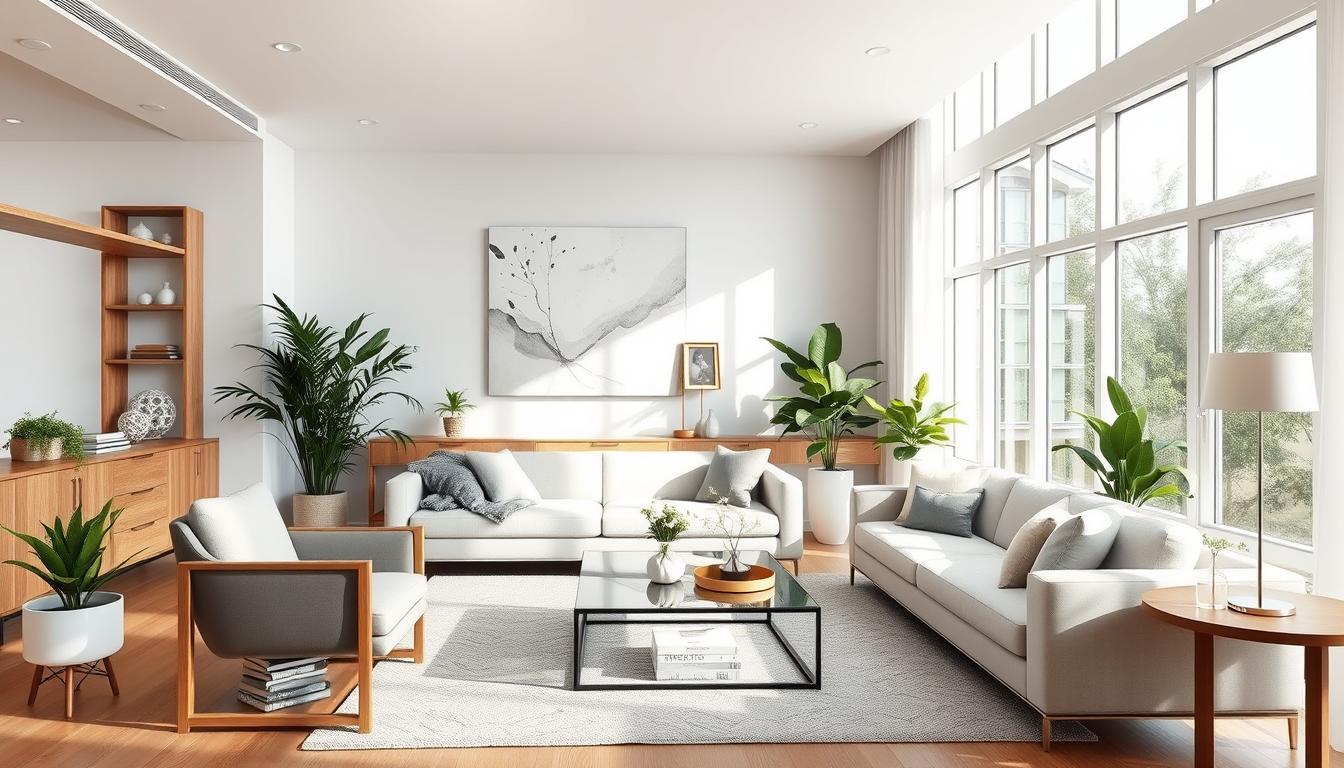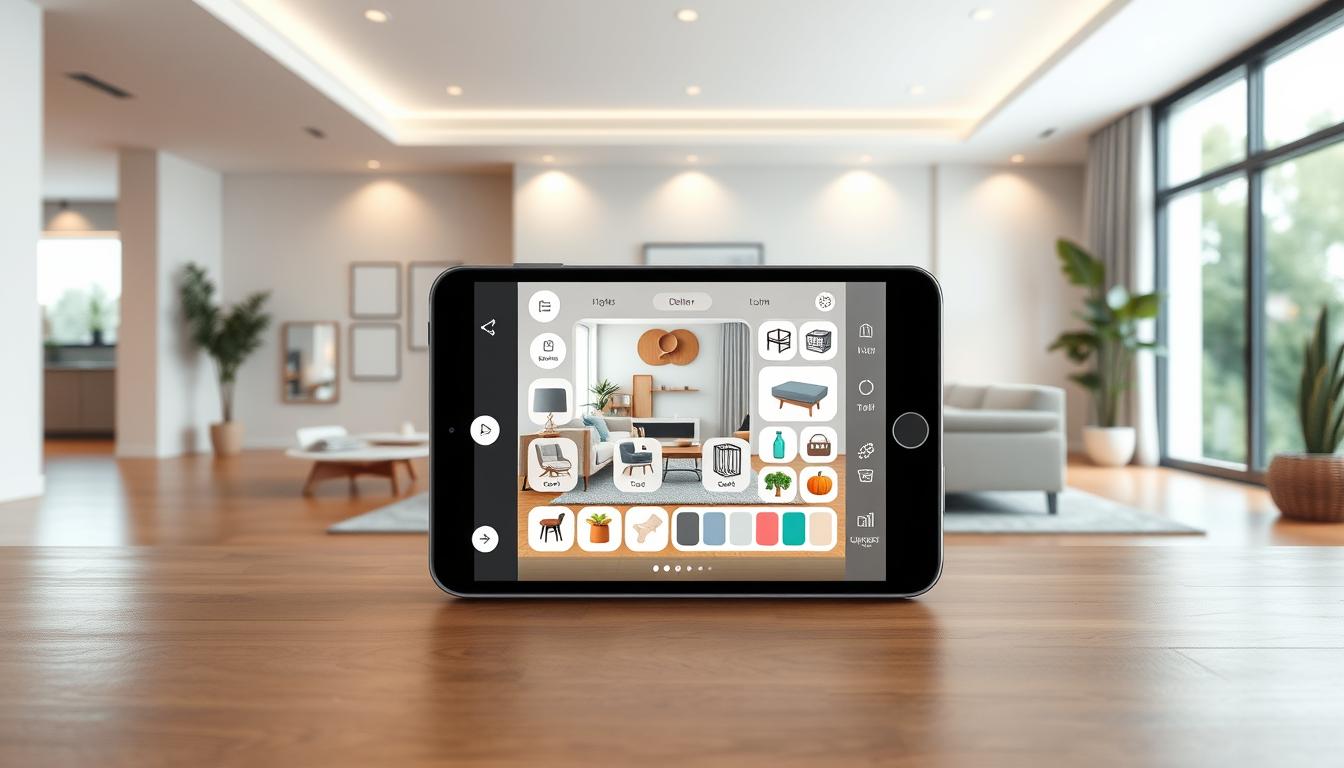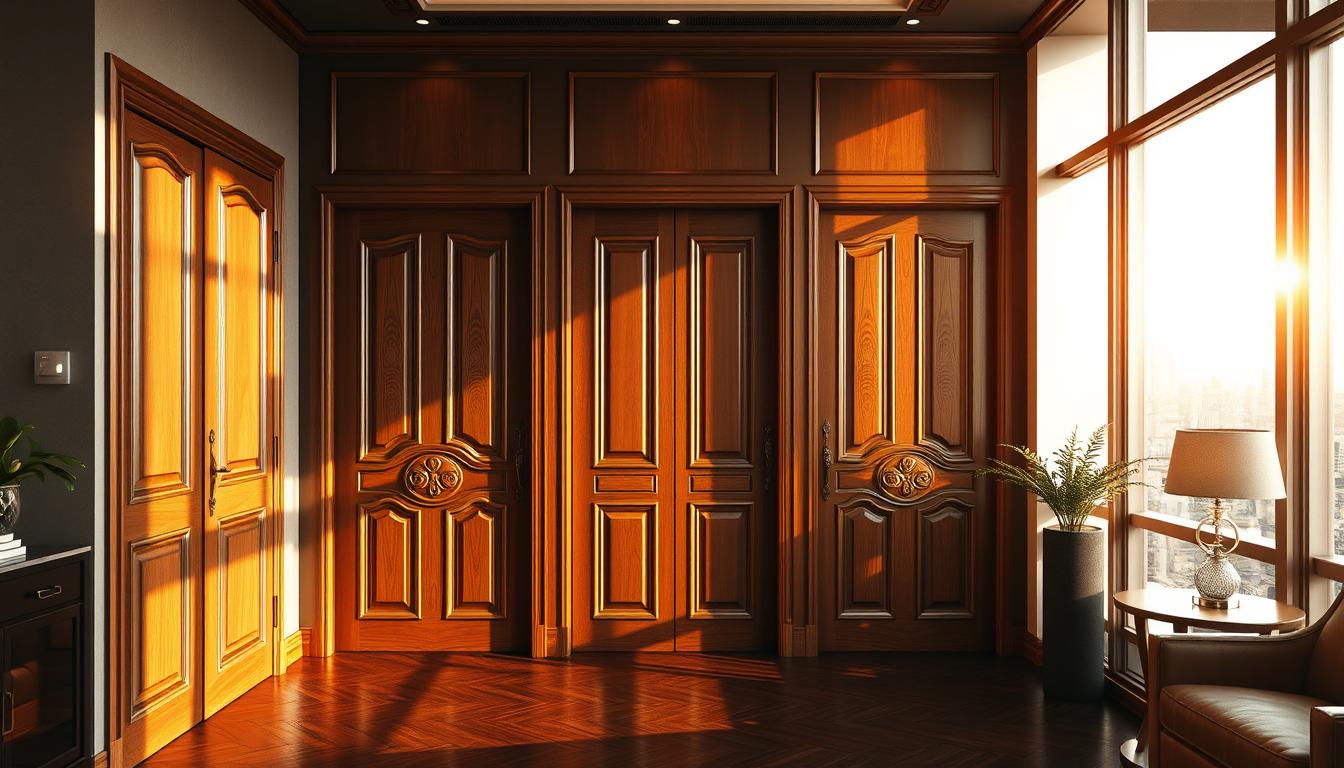Did you know a well-designed living space can make you happier and more productive? With the rise of stylish home interior designs, it’s easier to create a space that shows off your personality.
We’re excited to share our top home and interior design ideas to help you turn your space into a stylish oasis. We’ll look at modern minimalism, vintage chic, and more. These ideas will inspire you to refresh your home with a new look.
We aim to give you practical tips and design ideas to make your space special. Whether you want to update one room or your whole home, we’ve got you covered.
Key Takeaways
- Discover the latest trends in stylish home interior designs
- Learn how to create a cohesive look throughout your home
- Explore different design concepts to suit your style
- Get practical tips on implementing your design ideas
- Find inspiration for your next home decor project
Embracing Minimalism in Home Design
Minimalist interior design makes our homes peaceful and welcoming. It’s a big part of modern home design trends. This style is all about simplicity and less clutter.
Understanding Minimalism
Minimalism in home design means simplicity and less clutter. It focuses on the basics, removing what’s not needed. Design experts say, “Minimalism is not just about getting rid of stuff; it’s about making room for what’s truly important.“
This design is not just pretty; it also brings calm and clarity. Learning about minimalism helps us apply it to our homes.
Benefits of a Minimalist Approach
Minimalist home design has many benefits. It reduces clutter, making our homes more organized and peaceful. As interior design expert, Marie Kondo, says, “The purpose of a home is to create a space that brings joy and comfort to its inhabitants.”
- Reduced stress due to a clutter-free environment
- Increased focus on what’s truly important
- A more serene and calming atmosphere
Tips for Achieving a Minimalist Look
To get a minimalist look, start by decluttering and simplifying. Use clean lines, simple colors, and multi-use furniture. Add natural materials and textures for depth and warmth.
“The key to a successful minimalist design is not just about removing clutter, but also about creating a sense of harmony and balance in the space.” –
By using these tips, you can make a minimalist home that’s both beautiful and useful. Remember, the goal is a calm, inviting space that reflects your style.
Color Trends for Modern Interiors
Color can change a room’s feel, and 2023’s trends are exciting. This year, we see bold statements and calming colors. 2023 is all about embracing both bold statements and soothing palettes.
Popular Color Palettes for 2023
This year, earthy tones and bright colors are back. The top color palettes for 2023 include:
- Soft neutrals with a touch of warm terracotta
- Deep blues and greens for a calming atmosphere
- Bold and bright colors like coral and yellow for a statement piece
Using Color to Create Mood
Colors can make us feel certain ways. For example, cool colors like blues and greens can promote relaxation. Warm colors like oranges and reds can stimulate energy.
Think about the room’s purpose and mood when picking colors. This helps create a space that’s both beautiful and functional.
Accent Walls: A Bold Choice
Accent walls are still popular, adding a bold touch to rooms. By picking a different color for one wall, you create a focal point. This adds depth to the room.
When using an accent wall, match the color to the room’s scheme. This works well in living rooms and bedrooms, making a bold statement.
The Importance of Functionality in Design
A well-designed home is both stylish and practical. It balances form and function, making our living spaces better. Functionality is key in home design, affecting our daily lives.
Balancing Aesthetics and Utility
Designing a home means finding a balance between looks and use. A space that looks good but isn’t useful is as bad as one that works but looks bad. Multifunctional furniture helps achieve this balance. It does more than one thing, saving space and keeping things stylish.
For example, a storage ottoman can be a coffee table and a place to store things. It keeps clutter away and adds to the room’s look. A murphy bed can turn a bedroom into a room for many uses, great for small homes or guest rooms.
Multifunctional Furniture Ideas
Multifunctional furniture is essential for functional design. Here are some ideas:
- A desk with built-in storage keeps office supplies tidy.
- A sofa bed is perfect for guests in a living room.
- Nesting tables can be used as needed and stored away when not in use.
Smart Storage Solutions
Good storage keeps our homes clutter-free and functional. Smart storage solutions help keep things organized and hidden, improving our living spaces’ look.
Think about adding storage bins, baskets, and shelves to your design. For example, under-bed storage is great for using dead space in bedrooms. Hanging organizers can also make closets more efficient.
“The way you organize your space can significantly impact your productivity and overall well-being.”
Here are some popular smart storage solutions:
| Storage Solution | Description | Benefits |
|---|---|---|
| Under-bed storage | Storage bins or drawers under the bed | Utilizes dead space, keeps clutter hidden |
| Hanging organizers | Organizers hung in closets | Maximizes closet space, keeps clothes organized |
| Multifunctional furniture | Furniture with built-in storage | Serves multiple purposes, reduces clutter |
Sustainable Design Practices
Building an eco-friendly home is more than just helping the planet. It’s about making a space that’s good for those who live there. As we learn more about living sustainably, using eco-friendly design in our homes is key.
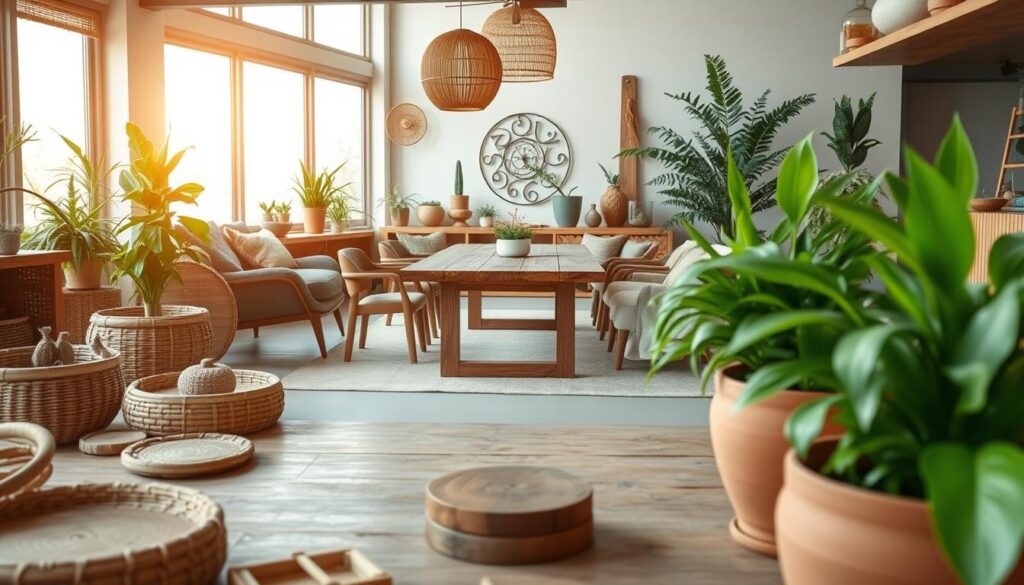
Eco-Friendly Materials to Consider
The materials we pick are vital in sustainable design. Eco-friendly materials are those that are good for the planet. They can be sustainably sourced, recyclable, or have a low environmental impact. Here are some examples:
- Bamboo flooring, which is highly renewable
- Recycled glass countertops, which reduce waste
- Sustainably sourced wood, certified by organizations like the Forest Stewardship Council (FSC)
Energy-Efficient Home Features
Being energy-efficient is a big part of sustainable design. Energy-efficient features help cut down our home’s carbon footprint. Here are some ways to do it:
- Installing solar panels to harness renewable energy
- Using LED lighting, which consumes less power
- Upgrading to energy-efficient appliances
Incorporating Biophilic Design
Biophilic design brings nature inside our homes. It improves our well-being and our connection to nature. Here’s how to do it:
- Adding plants and green walls to purify the air and enhance aesthetics
- Using natural materials and textures, such as wood and stone
- Incorporating large windows and skylights to maximize natural light
By using sustainable design, we can make homes that are not just beautiful but also good for the planet. It’s a step towards a greener future, and every choice we make matters.
Creating Inviting Living Spaces
The secret to a cozy home is in the details. This includes everything from the layout to the lighting. We’re excited to share our insights on how to create a warm and welcoming space.
Layout Tips for a Cozy Atmosphere
A good layout is key for coziness. Think about how your room flows and where you can create cozy spots. Arrange furniture so it encourages people to talk, like seating areas that face each other.
Also, leave some room between furniture to make the space feel bigger and more inviting. Use corner spaces wisely with corner sofas or reading nooks. Add rugs and curtains to bring warmth and texture.
The Role of Lighting in Home Design
Lighting sets the mood of a room. Use layered lighting with overhead, table, and floor lamps for a cozy feel. Warm light bulbs can make a space feel cozier.
Dimmable lighting is also great. It lets you change the light level for different times or activities. This makes your living space both cozy and functional.
Personal Touches: Decor That Reflects Us
Personal touches make a house feel like home. Add personal decor like family photos, heirlooms, or artwork. It adds character and tells your story.
Try a gallery wall or display personal items on a shelf. These not only look good but also make your space cozy and inviting.
Incorporating Technology in Interior Design
Technology is changing how we design our homes. Smart devices and home automation systems are making our living spaces more comfortable and convenient. They also change how our homes look and function.
Smart Home Devices to Enhance Comfort
Smart home devices are making our homes more comfortable. Thermostats learn our temperature preferences, and lighting adjusts with the day. For example, smart thermostats like Nest or Ecobee save energy and lower bills.
Smart lighting, like Philips Hue, lets us change room ambiance with our phones. We can adjust brightness and color for different moods or activities.
Home Automation for Convenience
Home automation makes our lives easier by connecting smart devices. We can control lighting, temperature, security, and entertainment from one place. For instance, voice assistants like Amazon Alexa or Google Assistant let us control our home with voice commands.
Integrating Tech Without Sacrificing Style
Adding technology to our homes shouldn’t ruin their look. Luckily, many smart devices are stylish and fit our decor. Smart door locks and speakers come in designs that match our homes.
| Brand | Features | Compatibility |
|---|---|---|
| Nest | Learning thermostat, temperature control, energy reports | Amazon Alexa, Google Assistant |
| Ecobee | SmartSensor for temperature and occupancy, remote sensors | Amazon Alexa, Google Assistant, Apple HomeKit |
| Honeywell | Smart alerts, energy-saving features, geofencing | Amazon Alexa, Google Assistant |
By picking devices that match our home’s style, we can enjoy technology without losing style.
Stylish Kitchen Ideas for Every Taste
Kitchens are now the heart of home design, blending style with function. We’ll look at what makes a kitchen stand out.
Open Concept Kitchen Designs
Open concept kitchens change how we cook and socialize at home. They remove walls, making spaces feel bigger and encouraging people to gather.
Benefits of Open Concept Kitchens include better socializing and a larger feel. To achieve this, consider removing walls or using partial dividers for a flow between areas.
Color and Material Choices for Modern Kitchens
Choosing colors and materials is key in modern kitchens. Neutral shades like whites, grays, and blacks are timeless and versatile.
Durable and eco-friendly materials are important. Quartz countertops and reclaimed wood are great for their lasting quality and green benefits.
- Think about a color scheme that shows your style.
- Pick materials that last and are good for the planet.
- Add textures for depth in your kitchen.
The Impact of Lighting in the Kitchen
Lighting is vital in kitchen design, for both looks and function. The right lighting can improve the mood and make the space more useful.
Layered lighting works well, with ambient, task, and accent lights. Under-cabinet lighting, for example, lights up countertops and adds warmth.
By focusing on open designs, color and material choices, and lighting, you can make a kitchen that looks great and works well.
Bathroom Design Inspirations
The bathroom is now a place for relaxation and rejuvenation. We’ll explore how to turn it into a luxurious retreat.
Spa-Like Features for Relaxation
To make your bathroom a spa, add features that help you relax. Rain showerheads and freestanding tubs are great choices. They look good and feel amazing.
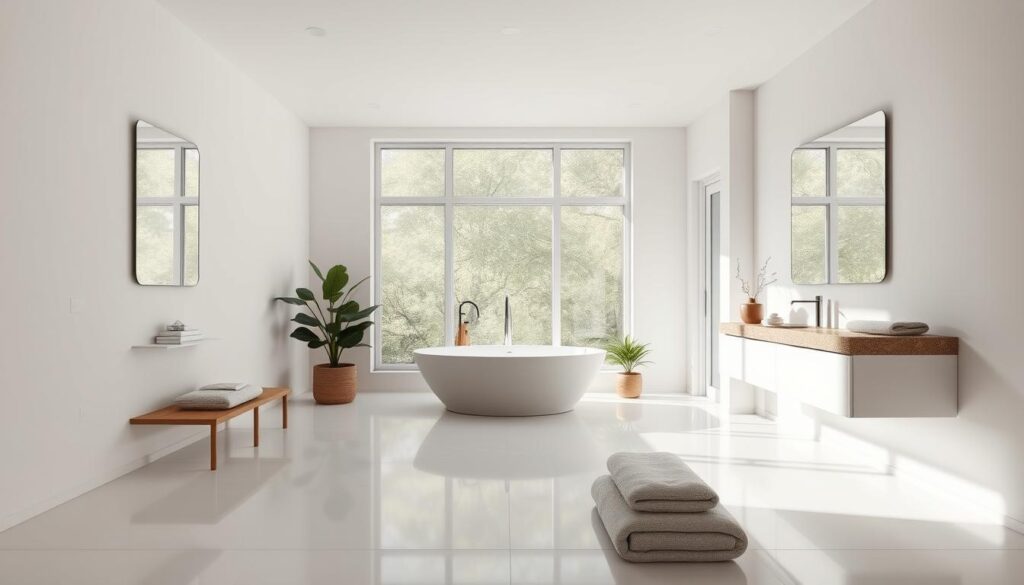
- Soft lighting for a calming feel
- Heated floors for warmth in cold months
- Aromatherapy systems for extra relaxation
Modern Fixtures and Fittings
Modern fixtures are essential for a stylish bathroom. Wall-mounted faucets and contemporary sink designs make a big difference. Plus, they save water and money.
Choose fixtures that match your bathroom’s style. For example, sleek faucets fit a minimalist look, while ornate ones suit a traditional style.
Storage Solutions for Small Bathrooms
In small bathrooms, good storage is crucial. Wall-mounted cabinets and recessed medicine cabinets save space and look good.
Don’t forget the space under the sink and around the toilet. Over-the-toilet storage units and under-sink drawers help keep things tidy and within reach.
Designing Functional Outdoor Spaces
Turning your outdoor area into a functional space can really boost your home’s look. As we look at home design trends, it’s clear that outdoor spaces are key parts of our homes now.
Outdoor spaces are more than just extra rooms. They’re where we chill, have fun, and enjoy nature. A good outdoor space can make our lives better.
Creating a Welcoming Patio
A welcoming patio is the heart of any good outdoor space. Think about the layout and how you’ll use it. It should match your lifestyle, whether for eating, relaxing, or parties.
For a cozy vibe, add comfy seats and the right lights. Styling your outdoor space with fire pits or heaters makes it useable all year.
Choosing Outdoor Furniture
Outdoor furniture needs to be tough and look good. Materials like recycled plastic, wicker, and metal are great because they last and are easy to care for.
When picking furniture, think about colors and styles that match your home. This makes your indoor and outdoor areas feel connected.
Incorporating Plants and Greenery
Plants and greenery make your outdoor space lively and inviting. Pick plants that fit your climate and don’t need much care.
Using a mix of plants with different looks and colors adds depth and interest. Try using planters and pots to add style and variety.
Personalizing Your Space
Personalizing our home means choosing decor and art that make our space beautiful and tell our story. By adding elements that show our personality, interests, and experiences, we make our home unique and welcoming.
Choosing Art and Decor That Speaks to Us
Finding art and decor that speaks to us is key to personalizing our space. It’s about picking pieces that match our home’s look and show our style and story. Think about the emotions and memories you want to share in your space when choosing art.
- Choose pieces with personal meaning, like art from local artists or family.
- Think about the color palette and how it fits with your decor.
- Don’t hesitate to mix styles and textures for depth and interest.
Family Heirlooms: A Touch of Nostalgia
Adding family heirlooms to our decor brings nostalgia and history to our space. These items can spark conversations and share our family’s story.
To display family heirlooms well, think about where they’ll go and how they’ll be seen. For example, a vintage piece can stand out on a gallery wall or a mantel.
Creating Gallery Walls
Gallery walls are a great way to personalize our space and share our favorite memories and art. The secret to a great gallery wall is mixing frame styles, sizes, and textures.
- Begin by collecting various frames and items to include.
- Arrange your pieces on the floor to plan the layout before hanging.
- Balance is crucial; mix large and small items and consider their visual weight.
By using these interior styling suggestions and focusing on personalizing our space, we can make a home that’s not just beautiful but also deeply personal and meaningful.
Final Thoughts on Home Design Trends
Our homes should show who we are. DIY home décor lets us add our personal touch. It keeps our homes up-to-date with the latest trends.
Practical Style
It’s key to stick to our style but also be open to new things. Mixing old and new can make our homes both beautiful and useful.
Adapting to Change
New design trends help us update our homes. They make our spaces look good and meet our needs.
As we keep changing our designs, we can find inspiration everywhere. DIY projects and current trends help us make our homes uniquely ours.

